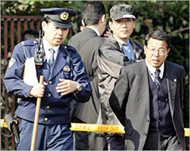Japan: Dissent threatens sect’s return
The Japanese sect which released Sarin gas into Tokyo’s underground system and killed 12 people in 1995 is trying to give itself a makeover in the hope of attracting new members.

But hardline elements within the sect oppose abandoning the core teachings upon which the group was founded.
Known for carrying out one of the deadliest crimes in Japan’s modern history, the Aum Shinrikyo sect also assassinated dissenting members and critics who spoke out against them.
The government arrested hundreds of the group’s members and sentenced its leader, Shoko Asahara, and 11 others to death.
In total, 189 members of the cult were found guilty on charges ranging from perjury and falsification of property documents to manufacturing weapons and perpetrating mass murder.
But the Japanese government was unable to outlaw the organisation – also known as the Doomsday cult – because it had been registered as a religion in the early 1980s and, therefore, been guaranteed constitutional protection.
In the decade since the underground train attack, the Aum Shinrikyo has kept a low profile and quietly undergone several changes including changing its name to Aleph and getting a new leader, Fumihiro Joyu.
Joyu’s plan for a national recruitment drive suggests that he believes the time is ripe for a return.
Cult appeal
“It is hard to believe, but people are still joining the cult,” said Susumu Shimazono, a professor of religion at Tokyo University who has studied the group’s development over the years.
 |
|
The Sarin gas attack on Tokyo |
Shimazono believes the sect’s allure is in its rigid organisational structure and the systematic way of life it promises to those who are tired of Japan’s fast-paced society.
“Some people feel that it is best for them to be separated from regular society … [making] Aum an attractive alternative.”
At the height of its power, Aum Shinrikyo had an estimated 20,000 acolytes around the world, but that number dropped to a core of around 1000 operating from 26 facilities across the country, according to the Japanese Public Security Investigation Agency.
The Japanese authorities were never able to put a halt to the sect’s recruitment drives as youngsters disillusioned with modern life sought spiritual solace in its combination of Buddhist and Christian teachings.
Famously reluctant to speak to outsiders, the cult’s press representatives refused to reply to Aljazeera.net’s requests for comments on reports that its strength is growing and it plans a return.
Hardline threat
According to Yoshifu Arita, an analyst who is keeping a close watch on the sect’s activities, its membership presently stands at around 1600 people, 80% of whom are hardliners.
“The hardliners have to stay with the cult because they have jobs within the organisation, they have given away all their goods to join and they have a sense of family or companionship within the cult,” he said.
Arita says the hardline faction will likely remain loyal to Asahara’s teachings even if he dies – or is executed.
Although Joyu is officially the new leader, the incarcerated Asahara still wields enormous influence.
His die-hard supporters are demanding that a revamped Aum – or Aleph – remain true to their guru’s apocalyptic teachings.
 |
|
Some members believe they |
But for Shoko Egawa, a Japanese journalist who was targeted by the group, a name change does not minimise their danger to the society.
“I hope the cult disappears in the next few years and even though I do not fear for my own safety any more, I am concerned that if the fundamentalist faction takes control, then it will pose a threat to Japanese society,” she said.
Egawa was hospitalised in 1994 after phosgene gas was released in her apartment by cult followers who sought to silence her articles critical of their pursuits.
Seeking reform
According to the Daily Yomiuri newspaper, Joyu – who served a prison term in the wake of the crackdown on the cult’s activities for forging property documents – told his supporters that Aleph could increase its revenues and attract new members through a public relations campaign.
Egawa believes Joyu preaches a more pragmatic line and is calling for the cult to recognise and apologise for mistakes it made in the past.
“The Joyu faction is not so large, but it is waging a very aggressive campaign to persuade the third faction in the cult – those who are undecided – to join them,” Egawa told Aljazeera.net.
While there is apparently general agreement within the sect that it should actively court new members, there are sharp divisions concerning the direction it should take in the coming years.
The hardliners are resisting Joyu’s campaign, with one member telling a recent seminar: “We have someone [within the cult] who has denied our leader and entered a den of iniquity.”
In August, a group of radicals went to a cult compound north of Tokyo and demanded that its leader, apparently loyal to Joyu, be dismissed.
The same group has demanded Asahara’s eldest daughter, Miwa Matsumoto, 27, lead the group in her father’s stead, an obvious challenge to Joyu’s leadership.
Possibility of violence?
The Metropolitan Public Security Department has expressed concern over the possibility the current war of words could spark violence.
Professor Shimazono believes the civil war may already have been won by the hardliners.
 |
|
Japanese authorities fear the |
“It’s not so much a threat to Japanese society at large, more at specific people within the society,” he said.
In 1989, a lawyer suing the Aum Shinrikyo group on behalf of families of estranged cult members was killed.
Tsutsumi Sakamoto, his wife, Satoko, and their one-year-old son, Tatsuhiko, were beaten and injected with a fatal drug by leading Aum Shinrikyo members.
In 1999, a revamped Aleph apologised for the murders and established a compensation fund.
But apologies for the 1995 attack have not been as forthcoming.
Shimazono believes this is a cause for concern: “They say the subway attacks were carried out by ‘bad members’ of the group and that the system itself was not responsible.
“They have never publicly declared that they were wrong,” he added.
“They should, but I don’t think they ever will.”